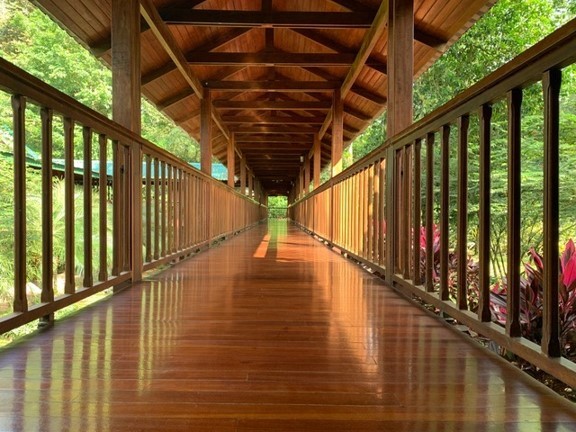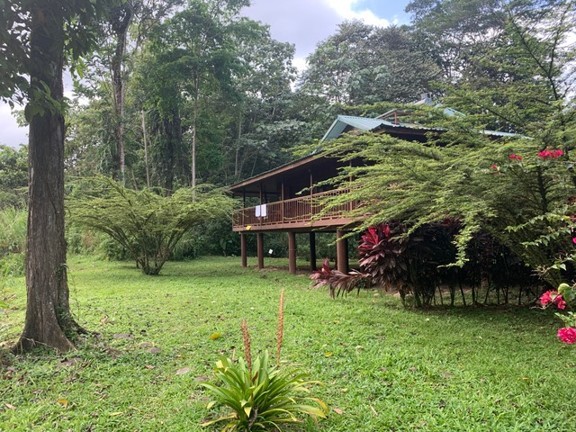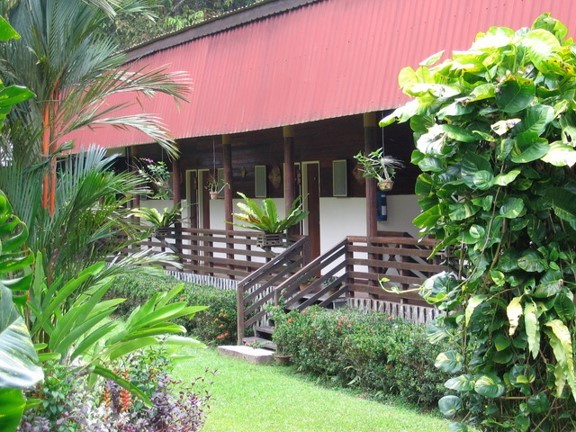When I asked where the gooey stains on my bed came from, my eco-lodge host explained they were animal droppings from the roof above, and the sheets would be changed immediately. As my gaze swept the room, I realized clean bedding wouldn’t solve my problems. There were holes in window screens, no mosquito netting, and a finger-length bug strolling in under the door. I had an arachnid roommate and little assurance critters wouldn’t be defecating on me as I slept. The host annoyed at my complaints, replied, “We realize this type of lodging isn’t for everyone.”
As I pondered what type of tourist tolerates bugs and droppings in their bed, I realized I hadn’t done my homework, and there were steps in picking an eco-lodge that would have kept my ethics and health intact.

An eco-lodge can get you closer to nature without sacrificing comfort – Photo Carol Patterson
Why Choose an Eco-lodge?
You probably picked your holiday destination because it offers things you’ve always wanted to see or gets you away from something you don’t want to see (more snow shovelling). You can increase the fun by staying at a lodge that gets you closer to nature and local people. Most properties that call themselves ‘eco’ are small and remote meaning more flexibility in your schedule, a connection with the host community, and nature guides to help you see things you’d overlook.
5 Ways to Pick an Eco-lodge
If you’re ready for a stay at an eco-lodge here are some tips for selecting a good one:
1 – Read Customer Reviews
Certifications can give an official blessing of a business’ “green-ness” but the best evidence of whether they’re balancing environment considerations with comfort is seen in guest reviews. Ignore any that seem unrealistic (complaining about bugs in a rain forest) and focus on those framed in reality (I expected insects in the forest, not in the bed).

Eco-lodges are closer to nature – Photo Carol Patterson
2 – Check out the Furniture
Before you book, look carefully at room pictures online. Unless you’re headed for polar regions, make sure you see evidence of window screens or mosquito bed nets. When you arrive, check for cleanliness or try ecotourism guide Brian Keating’s trick and look behind the pictures on the wall. “If you see geckoes it means they’re not using harmful chemicals,” he explained. It might take a little getting used to, but geckoes in your room mean more insects for them and fewer for you.
3 – Read the About Section
Take time to read the About Section on the lodge website. Look for membership in sustainable tourism organizations, policies regarding water and energy use, or ways the business gives back to the community.
4 – Expect Good Business Practices
Yes, things may be more remote or more rustic (the coolest places aren’t usually on the edge of the freeway), but you should still feel well taken care of. Your water might come from rainwater collection, but the shower should be clean. Lights may be solar-powered, but there should be flashlights or lit walkways to prevent falls.

With more than three decades in business, Sukau Rainforest Lodge knows how to balance comfort and nature – Photo Carol Patterson
5 – Look for Longevity
Running a lodge in natural locations needs skilled management. If the lodge you’re considering has been around for a few years, they have figured it out. Borneo’s Sukau Rainforest Lodge was named British Airways Tourism For Tomorrow winner in 1997, and now they are one of National Geographic Unique Lodges of the World, a credible recommendation that going green adds to the holiday fun.
With a little research, you’ll find a stay at an eco-lodge might be the best part of your next vacation.



